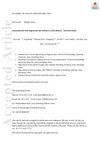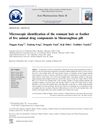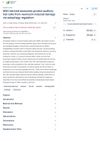
Melatonin helps grow cashmere goat hair by activating the Wnt10b gene.
March 2024 in “International journal of molecular sciences” The research identified key proteins that affect wool fiber thickness in Angora rabbits.
 September 2023 in “British Journal of Dermatology”
September 2023 in “British Journal of Dermatology” Hair regrowth from severe alopecia areata treatment with baricitinib can vary, with faster results in those with shorter hair loss duration.
May 2023 in “Frontiers in Pharmacology” Water extract of cacumen platycladi helps hair growth by affecting specific cell pathways.
 October 2022 in “Frontiers in Genetics”
October 2022 in “Frontiers in Genetics” The research found new potential mechanisms in mouse hair growth by studying RNA interactions.
 July 2022 in “Research Square (Research Square)”
July 2022 in “Research Square (Research Square)” Huaier helps hair grow back and repairs tissue after cancer treatment.
 May 2022 in “Frontiers in Cell and Developmental Biology”
May 2022 in “Frontiers in Cell and Developmental Biology” miR-29a-5p prevents the formation of early hair structures by targeting a gene important for hair growth and is regulated by a complex network involving lncRNA627.1.
February 2023 in “Frontiers in Pharmacology” Water extract of Cacumen Platycladi helps hair growth by activating specific cell pathways.
 64 citations,
January 2015 in “BioMed Research International”
64 citations,
January 2015 in “BioMed Research International” Certain growth factors can promote hair growth in mice by activating hair growth-related proteins.
18 citations,
November 2016 in “Transgenic research” Overexpressing Tβ4 in cashmere goats improves hair fiber traits and increases cashmere yield.
 5 citations,
July 2018 in “Experimental Dermatology”
5 citations,
July 2018 in “Experimental Dermatology” The "Punch Assay" can regenerate hair follicles efficiently in mice and has potential for human hair regeneration.
 4 citations,
January 2017 in “PubMed”
4 citations,
January 2017 in “PubMed” Epidermal growth factor helps stem cells heal wounds and regenerate hair follicles faster.
3 citations,
April 2009 in “PubMed” Melatonin may protect rat hair follicles from damage caused by oxidative stress after a burn.
 2 citations,
October 2023 in “Dermatology practical & conceptual”
2 citations,
October 2023 in “Dermatology practical & conceptual” More research is needed to understand hair and scalp disorders in people with skin of color.
 2 citations,
May 2012 in “Acta pharmaceutica sinica B”
2 citations,
May 2012 in “Acta pharmaceutica sinica B” The study found unique microscopic features for hair or feather in five animal ingredients in Shenrongbian pill.
 1 citations,
September 2023 in “Journal of the American Academy of Dermatology”
1 citations,
September 2023 in “Journal of the American Academy of Dermatology” Baricitinib helps regrow hair and improves quality of life and mental health in severe alopecia areata patients.
 1 citations,
March 2023 in “Skin”
1 citations,
March 2023 in “Skin” Baricitinib helps patients with severe alopecia areata regrow hair.
March 2022 in “Journal of cosmetic dermatology” Botanical extracts can help treat hair loss in people with certain genetic conditions.
Low doses of certain Chinese herbs can promote hair growth, while high doses may inhibit it.
 March 2024 in “Biochimica et biophysica acta. Molecular basis of disease”
March 2024 in “Biochimica et biophysica acta. Molecular basis of disease” Deferoxamine may help protect inner ear cells from damage caused by oxidative stress.
 January 2024 in “Biological Research”
January 2024 in “Biological Research” Tiny particles from stem cells can help protect ear cells from antibiotic damage by helping cells remove damaged parts.
 November 2023 in “Dermatology and Therapy”
November 2023 in “Dermatology and Therapy” Baricitinib treatment helps regrow eyebrow, eyelash, and scalp hair in severe alopecia areata, improving patients' emotional well-being and quality of life.
1 citations,
August 2021 in “Medical Science Monitor” Male and female hair loss have different genetic causes.
 April 2023 in “Research Square (Research Square)”
April 2023 in “Research Square (Research Square)” Exosomes protect ear hair cells from damage by controlling cell waste removal, potentially helping treat hearing loss.
 2 citations,
April 2017 in “Molecular Medicine Reports”
2 citations,
April 2017 in “Molecular Medicine Reports” Blocking autophagy increases survival of inner ear hair cells exposed to gentamicin.
 1 citations,
September 2022 in “Journal of The American Academy of Dermatology”
1 citations,
September 2022 in “Journal of The American Academy of Dermatology” Baricitinib helps grow eyebrows and eyelashes in severe alopecia areata patients.
48 citations,
January 2008 in “European Neurology” Thallium poisoning causes pain, hair loss, and nerve issues, treatable with hemoperfusion and hemodialysis.
 17 citations,
June 2019 in “BMC genomics”
17 citations,
June 2019 in “BMC genomics” Non-coding RNAs help control hair growth in cashmere goats.



















